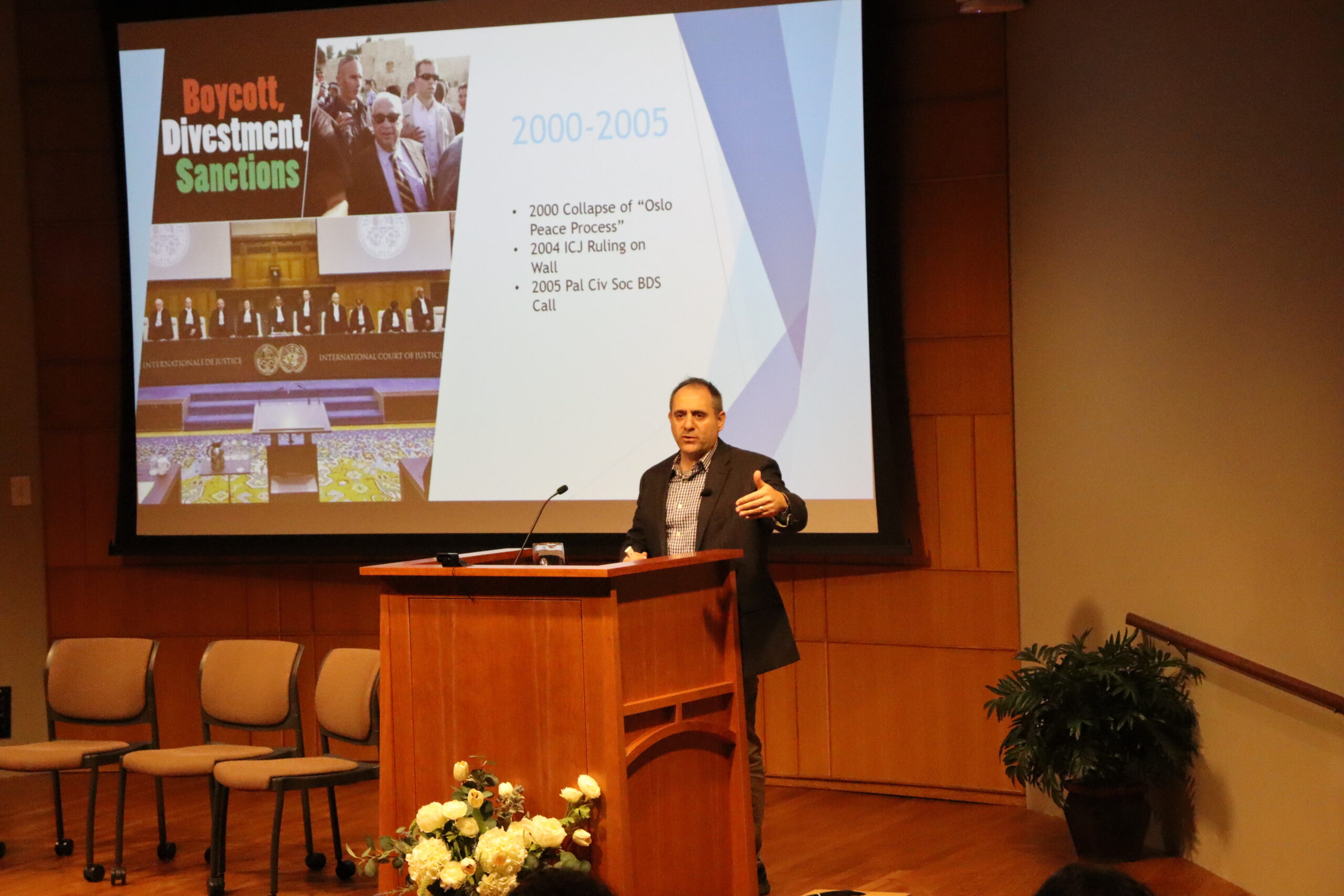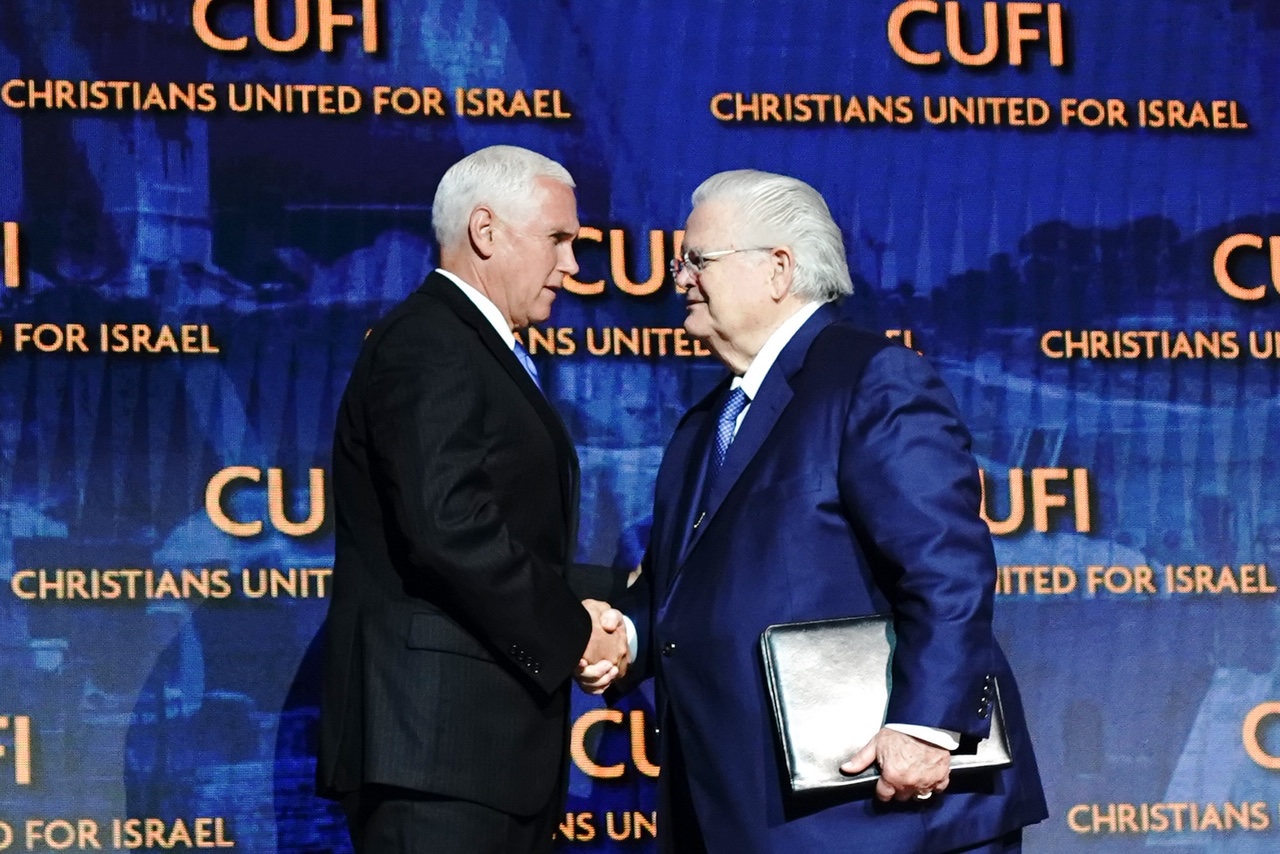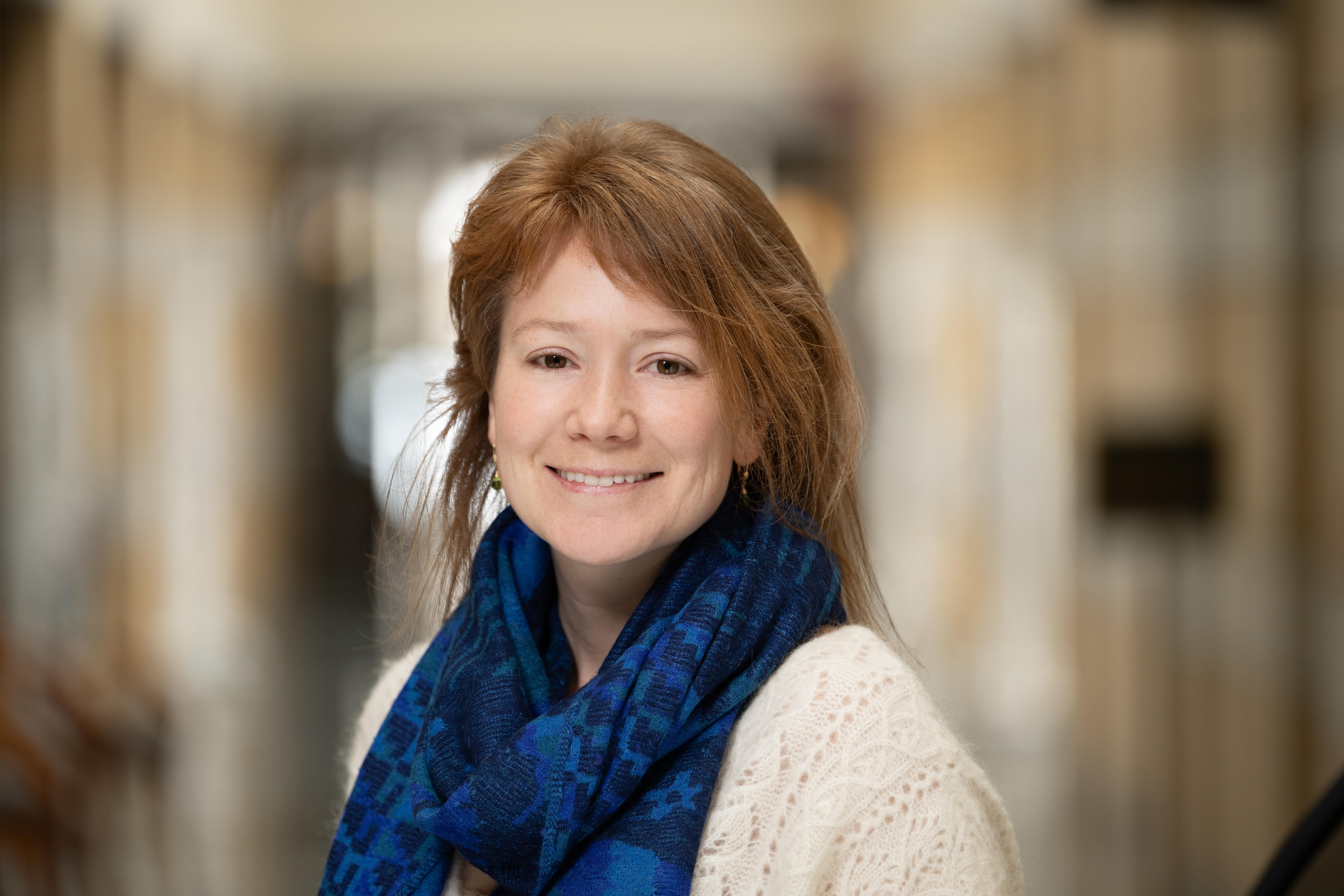
On Mar 5, 2024, the Contending Modernities research initiative held the event “Antisemitism and Other Hates.” The title reflected a core contention of the event itself: a rejection of the prevalent and simplistic idea that anti-Jewish sentiment can be best located in individuals, rather than systems. Indeed, the lecture interrogated the assumption that modern antisemitism can be studied apart from the wider history of racism in Europe and its colonial enterprises, and apart from the dynamics of modern nation state formation and consolidation.
The second of a two-part event on Judaism and Palestine/Israel, “Antisemitism and Other Hates” explored the modern deployment of anti-Jewish sentiment in Europe before tracing the way allegations of antisemitism have come into contemporary force through smear campaigns, lawfare, and legislation in service to nation-state ends. Featuring Yousef Munayyer, Head of the Palestine/Israel Program and Senior Fellow at the Arab Center, DC, the event challenged the ahistorical discourse around antisemitism and illuminated the ways in which minoritized communities are targeted and endangered by networked state campaigns relying on similar racial and colonial logics. Where the first event, a conversation between Mikhael Manekin and Rabbi Brant Rosen, explored the Jewish ethical tradition and their critique of the utilization and capture of religion by the state, this second event showcased how the logics of modern nation state power co-opt and hollow out such traditions in order to become the ultimate referent for a community’s identity.
Antisemitism and European Questions
Antisemitism, as well as its mirror, philosemitism, collapses Jews and Jewish life into ahistorical figures, i.e. projections of non-Jews’ ideas about Jews. As Brian Klug wrote on Contending Modernities’ blog, “From [the conversion to Christianity of Flavius Valerius Constantinus] on, Europe has used the Jews to define itself. The question, which we might rename “the European Question,” was this: What is Europe? Answer: not Jewish.” This negative self-definition, partnered with political and economic scapegoating and supersessionist Christian theology, was harnessed towards the creation of “nations” of people that then claimed territorial sovereignty in the states of modern Europe.
Contending Modernities has devoted numerous articles to the genocidal violences of European modernity; the campaigns for supremacy of one group instituted and reinforced through the mechanism of the state. The confluence of discourses of blood purity and civilization, imbricated with religious hierarchies, and imperial modes of political and territorial control are implicated in the erasure of communities across the world. Religious institutions have often participated: Scott Appleby writes of the Catholic Church’s alliance with fascist regimes in Europe in its opposition to secularism and communism, in spite of the horrors unleashed by these regimes. However, as Atalia Omer noted in her introduction to the event on March 5, antisemitism and the Shoah have been cast as unique in ways that invisibilize the role of these state and community-supported hierarchies. This framing obscures the need to interrogate antisemitism together with other forms of racism and prejudice. Its presumed uniqueness then justifies violence (narrated as “self-defense”) in turn.
Antisemitism and the State
The discourse around antisemitism has reached a fever pitch in the United States, notably taken up and mobilized by politicians on the right of the spectrum to target speech at universities related to the ongoing Israeli assault in Gaza and the Hamas attacks on October 7, 2023. Anti-Jewish sentiment and attacks have seen an uptick in the US, along with hate crimes against Blacks, Muslims, Arabs, and others.
Allegations of antisemitism have also increasingly been used to vilify and silence outcry regarding the treatment and killing of Palestinians, an effort which seeks to collapse the distinction between anti-Jewish sentiment and criticism of Israeli state policy. This mobilization banks on ignorance of geopolitical and historical realities such as European Christian Zionists “giving” and partitioning land on which Palestinians were already living to Jewish Europeans at the turn of the 20th century. Allegations of antisemitism tap into orientalist imagery of the violent, barbaric (terrorist) Muslim Other. Omer continued in her introduction:
In other words, we seek to grapple with how the weaponization of antisemitism, (turning it into a weapon authorizing violence against Palestinians and erasures of Palestinian narratives) also thrives on Islamophobic tropes and imperial designs: the narrative twist redirects our attention from a focus on territory to terrorism while also projecting onto the native Palestinian the European Nazi imageries and persistently reproducing a narrative of Jewish powerlessness, even though Israel is a sovereign nuclear state that controls every facet of Palestinian lives in the land—having even the ability to turn off running water in Gaza for 2 million people.
Guest lecturer Dr. Yousef Munayyer brought the conversation on allegations of antisemitism back once more to the nation-state system and narrative framings meant to legitimate the state. A political scientist by training, Munayyer traced the development of Israeli government responses to international pressure for Palestinian civil and human rights through Israeli government and pro-Israel network reports and event recordings. After early bumbling responses to the Gaza war of 2010 and Gaza flotilla, Munayyer shared, the Netanyahu government restructured the “Ministry of Strategic Affairs and Public Diplomacy” (MSA) in 2009 to manage global dissent. Seeking to create a network to fight the Boycott, Divestment, and Sanctions (BDS) movement and other activism, the ministry organized a global network of pro-Israel organizations, pro-Israel attorneys, and pro-Israel social media influencers. These networks soon moved away from reactive postures towards offensive attacks, in many instances framing critics of Israeli policy as “terrorists.”
The utilization of antisemitism allegations, however, did not come into full force until 2019; Munayyer traced a jump in MSA report references to antisemitism from a dozen to nearly three hundred in the space of that year. In MSA network event recordings, speakers made the rationale for this increase explicit: classifying opposition to Israeli policy as “anti-Israeli” was a matter of political disagreement, and therefore protected speech in the United States and other places. However, classifying opposition to Israeli policy as harassment and antisemitism got around US First Amendment protections; this approach, one speaker noted, “is the most important weapon in our arsenal.”

This approach, unsurprisingly, comes at a high cost to Jews in the US and Europe who speak out against Israeli policies, particularly policies that endanger Palestinians. It generates a logic where Jews are accused of antisemitism, where allegiance to a government’s policy determines who is a “good” Jew and who is a “self-hating” Jew or “un-Jew”–with very real consequences. It validates those who use caricatures of Jewishness to push the “great replacement theory” and other violent rhetoric. This creates, to paraphrase Munayyer, marriages of mutual political interest between Christian and Jewish Zionists and people who are ethnoreligious nationalists and white supremacists who can use the validation of pro-Israel voices as cover for own antisemitism. As Michelle Goldberg elaborated in the New York Times on March 7, 2024,
There’s also a tendency for some in the Jewish establishment to overlook antisemitism among supporters of Israel. That’s how we ended up with the end-times preacher John Hagee, who has said that Hitler was sent by God to drive the Jews to their rightful home in the holy land, speaking at a major November rally against antisemitism, and the Anti-Defamation League praising Elon Musk, despite both Musk’s own antisemitic posts and the platform he’s given to virulent Jew haters.
It comes at a higher cost, however, for US and Europeans racialized as Muslim or Palestinian: the example of three college students shot in Vermont while walking through a neighborhood wearing keffiyehs is just one instance of such deadly violence. And, of course, it silences and embattles legitimate efforts to protect life, leaving the United States largely silent in the face of a “plausible” genocide now counting the deaths of over 13,000 children in a shocking 8 month time span, with famine and starvation setting in.
In Service to State
The Jewish tradition has historically been deeply skeptical of state power, guest lecturer Mikhael Manekin, former director of Breaking the Silence and now leader with the Faithful Left movement in Israel, shared on March 4th. Political Zionism, and its very recent religious Zionist turn, are departures from centuries of tradition and were the source of heated discussion and opposition at the turn of the 20th century.
It is notable, then, how the contemporary weaponization of antisemitism allegations illuminate the work done to collapse the distinction between Jewish identity and the State of Israel. It is the realization of an ethno-religious state project where ultimately, the only way to imagine Jewish community is as, first and foremost, an exclusionary political project predicated on the domination of Palestinians. The community of people become subsumed by the state, where antisemitism allegations are predominantly used to defend not Jews or Jewishness, but a state’s international and legal standing.

